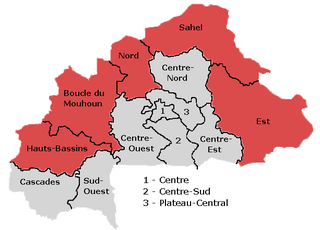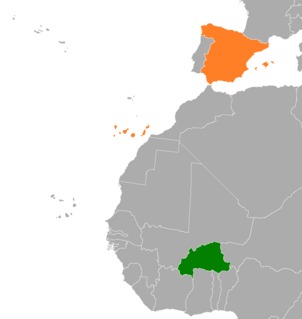| |||||
| Decades: | |||||
|---|---|---|---|---|---|
| See also: | |||||
Events in the year 2012 in Burkina Faso .
| |||||
| Decades: | |||||
|---|---|---|---|---|---|
| See also: | |||||
Events in the year 2012 in Burkina Faso .

Burkina Faso is a landlocked country in West Africa with an area of 274,200 km2 (105,900 sq mi), bordered by Mali to the northwest, Niger to the northeast, Benin to the southeast, Togo and Ghana to the south, and the Ivory Coast to the southwest. It has a population of 20,321,378. Previously called Republic of Upper Volta (1958–1984), it was renamed Burkina Faso by President Thomas Sankara. Its citizens are known as Burkinabè, and its capital and largest city is Ouagadougou.

Burkina Faso is a landlocked Sahel country that shares borders with six nations. It lies between the Sahara desert and the Gulf of Guinea, south of the loop of the Niger River, mostly between latitudes 9° and 15°N, and longitudes 6°W and 3°E. The land is green in the south, with forests and fruit trees, and semi-arid in the north. Most of central Burkina Faso lies on a savanna plateau, 198–305 metres (650–1,001 ft) above sea level, with fields, brush, and scattered trees. Burkina Faso's game preserves – the most important of which are Arly, Nazinga, and W National Park—contain lions, elephants, hippopotamus, monkeys, common warthogs, and antelopes. Previously the endangered painted hunting dog, Lycaon pictus occurred in Burkina Faso, but, although the last sightings were made in Arli National Park, the species is considered extirpated from Burkina Faso.

Thomas Isidore Noël Sankara was a Burkinabé military officer, Marxist–Leninist revolutionary, and pan-africanist, who served as President of Burkina Faso from his coup in 1983 to his deposition and murder in 1987. Viewed by supporters as a charismatic and iconic figure of revolution, he is commonly referred to as 'Africa's Che Guevara'.

The Agacher Strip War or Christmas War was a war fought by Burkina Faso and Mali over a 160-kilometre-long (100 mi) strip of land along the border in northern Burkina Faso from 25 to 30 December 1985. The war ended in a ceasefire. The Agacher Strip had been subject to a border dispute between Mali and Burkina Faso since the 1960s. Following armed clashes in 1974, both countries agreed to mediation to resolve their differences. Progress on a solution stalled, and in 1983 Burkinabé President Thomas Sankara and Malian President Moussa Traoré decided to have the border dispute settled by the International Court of Justice and subsequently petitioned the body to resolve the issue.
Gold Mining often plays a significant role in Burkina Faso’s economy. Burkina Faso has become Africa's 4th biggest producer of gold in 2012. Production of mineral commodities is limited to cement, dolomite, gold, granite, marble, phosphate rock, pumice, other volcanic materials, and salt.
Prostitution in Burkina Faso is not specifically prohibited by the law, but soliciting and pimping are illegal. Burkinabe society only accepts sexual intercourse within marriage. In 2009, Voice of America reported that the number of prostitutes in Burkina Faso had increased as a result of the country's poverty. The increase in prostitution has given rise to fears of an increase in the number of Burkinabés infected with HIV and AIDS. UNAIDS estimate there to be 31,000 prostitutes in the country.
Burkina Faso is a country of origin, transit, and destination for persons, mostly children, subjected to trafficking in persons, specifically forced labor and forced prostitution. The Government of Burkina Faso provided data from the Ministry of Social Action showing that, in 2009, security forces and regional human trafficking surveillance committees intercepted 788 children Burkinabe and foreign children, 619 of whom were boys, destined for exploitation in other countries, principally Côte d'Ivoire, Mali, and Niger. Child trafficking victims who remain inside Burkina Faso are usually found in large cities such as Ouagadougou, Bobo-Dioulasso, Nouna, and Hounde. Child victims face conditions of forced labor or services as plantation and mining hands, laborers on cocoa farms, domestic servants, beggars recruited as pupils by unaccredited Koranic schools, or captives in the prostitution trade. To a lesser extent, traffickers recruit Burkinabe women for nonconsensual commercial sexual exploitation in Europe. Women from neighboring countries like Nigeria, Togo, Benin, and Niger migrate to Burkina Faso on the promise of respectable work, but are subjected to forced labor in bars or forced prostitution.
The 2011 Burkina Faso protests were a series of popular protests in Burkina Faso.

On 15 January 2016, gunmen armed with heavy weapons attacked the Cappuccino restaurant and the Splendid Hotel in the heart of Ouagadougou, the capital of Burkina Faso. The number of fatalities reached 30, while at least 56 were wounded; a total of 176 hostages were released after a government counter-attack into the next morning as the siege ended. Three perpetrators were also killed. The nearby YIBI hotel was then under siege, where another attacker was killed. Notably, former Swiss MPs Jean-Noël Rey and Georgie Lamon were killed. Responsibility for the attack was claimed by Al-Qaeda in the Islamic Maghreb (AQIM) and Al-Mourabitoun.

On 2 March 2018, at least eight heavily armed militants launched an assault on key locations throughout Ouagadougou, the capital city of Burkina Faso. Targets included the French embassy and the headquarters of Burkina Faso's military.

Terrorism in Burkina Faso refers to non-state actor violence in Burkina Faso carried out with the intent of causing fear and spreading extremist ideology. Terrorist activity primarily involves religious terrorism conducted by foreign-based organizations, although some activity occurs because of communal frustration over the lack of economic development. Recent attacks have concentrated in the Hauts-Bassins, Boucle du Mouhoun, Nord, Sahel, and Est regions, along the border with Mali and Niger. A series of attacks in Ouagadougou in 2016, 2017, and 2018 by al-Qaeda in the Islamic Maghreb and its affiliates garnered international attention.

Burkina Faso–Spain relations are the bilateral and diplomatic relations between these two countries. Burkina Faso does not have an embassy in Spain, but its embassy in Paris, France, is accredited to Spain. and consulates in Almería, Barcelona, Madrid and Valencia. Spain has no embassy in Burkina Faso, but its embassy in Abidjan, Ivory Coast is accredited to Burkina Faso, and a consulate in Ouagadougou.

Crime in Cote d'Ivoire is prevalent and versatile across the West African country. The most common forms of crime include child labour, arms trafficking, terrorism and human rights abuse. Other less common, but still evident types of crime include cannabis and synthetic drug trade, sex trafficking, fauna and flora crimes.
Events in the year 2011 in Burkina Faso.
Events in the year 2010 in Burkina Faso.
On 3 May 2021 Islamic militants attacked Kodyel, a village in Foutouri, Burkina Faso. The attack left at least 30 people dead and another 20 injured.

On 4 and 5 June 2021, insurgents attacked the Solhan and Tadaryat villages in the Yagha Province of Burkina Faso. The massacres left at least 174 people dead. Insurgents have been attacking the Sahel Region, along the border with Mali, since Islamists captured parts of Mali in 2013.

An ongoing war and civil conflict between the Government of Burkina Faso and Islamist rebels began in August 2015 and has led to the displacement of 1.9 million people and the deaths of at least 2,000 civilians and combatants.

Islamist insurgency in the Sahel or Jihadist Insurgencies in the Sahel refers to the Islamist insurgency in the Sahel region of West Africa following the 2011 Arab Spring to the present day. In particular, the intensive conflict in the three countries of Mali, Niger and Burkina Faso has been referred to as the Sahel War.